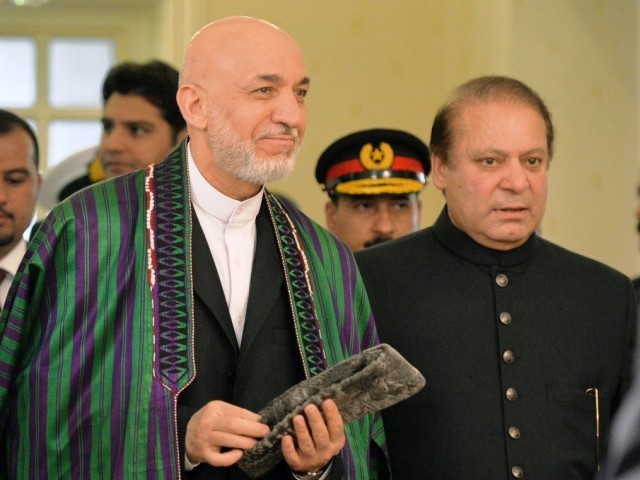Afghan-Pakistan Relations Take A Turn For The Worse
Hamid Karzai and Nawaz Sharif

NEW DELHI: Outgoing Afghan President Hamid Karzai’s farewell speech was reflective of the dip in relations between Afghanistan and Pakistan, which, with increasing attacks by the Taliban in Afghanistan coupled with accusations blaming Pakistan, have hit their lowest point in over a decade.
In his farewell speech, Karzai said, "Today, I tell you again that the war in Afghanistan is not our war, but imposed on us and we are the victims,” adding that, “No peace will arrive unless the U.S. or Pakistan want it." In the same vein, Karzai, whilst addressing the Afghan parliament a few months ago had said, that the war in Afghanistan had been “imposed” on the country and that the US should demonstrate seriousness about bringing peace to the war-torn country by targeting “terrorist sanctuaries” and countries that support “terrorism” - a reference to Pakistan.
There have been two developments that have increased Afghanistan’s concern that Pakistan is directly or indirectly, strengthening the Afghan Taliban. One, with the Pakistani military launching Operation Zarb-e-Azb in North Waziristan, several thousand militants have crossed the border into neighbouring Afghanistan.
Although Pakistan and Afghanistan signed a cross border agreement to monitor this movement, the process itself was fraught with tensions, with Karzai demanding that Pakistan meet a series of conditions as a prerequisite for his cooperation.
In a letter handed over to Pakistani Prime Minister Nawaz Sharif by Karzai’s top security advisor during a one day visit to Islamabad, the Afghan President stated outlined the following conditions: “(1) all terrorists are targeted without discrimination, (2) civilians are not harmed in the fight against terror, (3) Pakistan releases all detained Afghan Taliban leaders who support peace in Afghanistan, (4) all terrorist hideouts and support centres are eliminated, (5) Pakistan stops artillery shelling on Afghan territory, (6) Pakistan and Afghanistan coordinate their anti-terrorism efforts with important regional nations like India and China, (7) there should be a roadmap for bilateral coordination and contact to take the war on terror forward.”
The letter came a few days after tensions rose between the two countries following an allegation that linked the killing of three soldiers and eight civilians in Dangam district, eastern Kunar province, to Pakistani soldiers. Afghan Foreign Ministry spokesperson Ahmad Shakib Mustaghni had said that “Pakistani forces, wearing civilian clothes, carried out the attack” in Dangam district.
Pakistan’s Foreign Ministry issued a statement in response, rejecting the allegations and asking the “Afghan government to refrain from taking any action that may be detrimental to peace and stability on the border.”
These tensions, although exacerbated recently, are not new. Afghan officials have long blamed Pakistan’s Inter Service Intelligence Agency (ISI) for nurturing and supporting militancy across the border. Quoted in the Washington Post this week, Afghan interior minister Mohammad Umer Daudzai explained the rationale behind this suspicion when he said, “We know they [Pakistan] have not given up their dream of controlling Afghanistan. They want Afghanistan to be their satellite.”
Pakistan points out that they too are suffering from the same terrorist acts on their own soil. In the same article in the Post, Gen. Asim Bajwa, a spokesman for the Pakistani military said, “We have made it very clear that Pakistan is determined to eliminate all terrorists and sanctuaries from Pakistan and is also committed to ensure that our soil is never used for any terrorist activity abroad.”
This links to the second recent development that has added to Afghanistan’s paranoia. Earlier this month, the Punjab Taliban -- an influential militant faction of the Tehreek-e-Taliban Pakistan (TTP) -- declared that it would abandon violence within Pakistan, and focus its energy toward Afghanistan instead. “We will confine our practical jihadist role to Afghanistan in view of deteriorating situation in the region and internal situation of Pakistani jihadist movement,” Punjabi Taliban chief Ismatullah Muawiya was quoted in a pamphlet circulated to the media. The internal situation of the Pakistani Jihadist movement refers to setbacks being faced by the TTP, most recently, the breakaway of a faction led by Jamatul Ahrar -- which claims it has the support of 70-80 percent of the TTP’s fighters and commanders -- from the main TTP bloc led by Mullah Fazlullah.
Whether the Pakistani government is actively supporting militants in Afghanistan or not, the fact is that the militant movement in Afghanistan and Pakistan is influenced in turn by the other. In that respect, with militancy in Pakistan witnessing a reorganisation in the face of a sustained military operation, and militancy in Afghanistan seeing an increase in attacks and resulting in twice the number of fatalities as in the corresponding period last year, it is in the interest of both the Pakistani and Afghan government to cooperate and mend ties.



